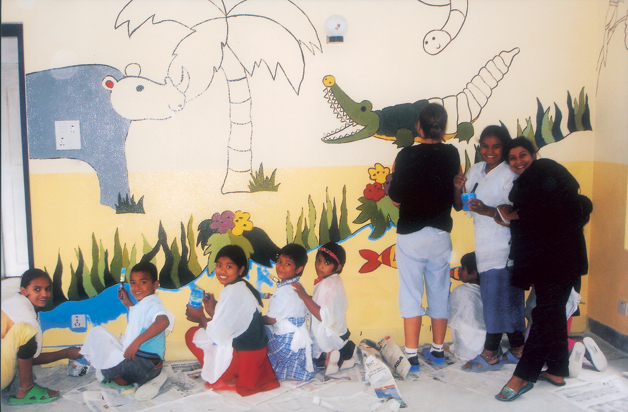
A social worker, Shobha Rai who was working as a volunteer in an NGO, was shocked when she was faced with a disturbing reality: “I had only been a month in the organization when I learnt that the director was sexually abusing the children. That NGO had twenty-one children, and when I was sure about the abuse, I approached the concerned authorities.” Thereafter, Shobha’s life changed as she took on the responsibility to look after some of these children.
Soon after, in February 2000, Shobha started Nepal Matri Griha (NMG) in a small building near Gangabu Chowk with some of the children from the previous organization. With the money she borrowed from her family members, she was able to pay the rent for six months and was also able to feed the children with her own money. But she could not do more than provide the basic necessities. Recalling those days, she says, “At that time, Gerrit Brinkmann, a teacher from Holland who is also the founder of an NGO called, ‘Mitrata Nepal’, helped me with the kitchenware while my parents provided me with mattresses.”
A few days later, Shobha came across Gereon Wagener, the project coordinator of BONO Direct Aid Association, Germany. Wagener visited NMG and could not believe his eyes, “I had stepped into an empty house with very poor infrastructure, not even a bed. And they were sleeping on mattresses arranged on the floor.” One more story had touched him and he decided to help.
Since then, Nepal Matri Griha has developed into a unique and convincing center for socially deprived and disabled children. In 2002, the organization opened its children’s home, a haven for 30 children. Shobha has become a mother for them as she spends all her time with the children. She also lives in the same building to take care of them.
In the last three years, Nepal Matri Griha has established an Integrative Social School with a Therapy Center, which is unique in Nepal. At present, 215 children study in this school while more than 50 disabled children receive physiotherapy and speech therapy in the Therapy Center, which is located right next to the school. The great advantage of the integrative approach is that the disabled and non-disabled children live together and because of the close association, the children get to know about the hardships faced by their disabled friends and in this way learn to support and help them instead of laughing at them.
In a span of nearly six years, NMG, a home for orphans, handicap children and destitute children has seen change on many levels. One successful example is Kanchhi Maharjan, who was suffering from cerebral palsy (C.P). This was a child Shobha brought from the previous organization. When she came to NMG, she could not even walk, but today Kanchi can take care of herself.
Shobha recalls, “In the old organization, Kanchhi was kept on a dirty blanket the whole day. She could not walk, eat or talk. Nobody took care of her, and they did not even clean her regularly.” Due to the intensive care and affection of Shobha Rai and the physiotherapy training she received, Kanchhi is now able to walk, go to toilet on her own, eat and to live an almost “normal” life. It is a tremendous change, which highlights the amazing feat, which Shobha and her team have achieved.
Another case in point is Shai Giri, who also suffers from cerebral palsy and lives in the children’s home. After his mother was pregnant with her second baby, she was afraid of delivering another disabled child. Unaware of the fact that Cerebral Palsy is not hereditary, she took rat poison in order to abort the young baby in her womb. She died despite all medical attempts to save her life. Shai’s father took to drinking heavily and was unable to take care of his only son. During the day when he was out, Shai was tied up at the table in a small dark and damp room in Mitra Park. After Nepal Matri Griha took charge of Shai, he has developed his abilities to walk and talk. He is now able to express himself and to follow his daily routine.
Having understood that Gereon Wagener was special to the children at NMG, I put forward my final question to which Shobha reflected, “It is not just the financial support, but also the continuous emotional support he gives to the children that makes a difference. He takes them for outings and eating out and cares to find out how they are doing.”
Talking about future plans she says, “We are looking forward to conducting skill development and income generation training for our children. We also plan to open up five village health posts with a therapy center.”
NMG is also involved with several other projects and activities. “We lend partial financial medical support to poor children and parents of underprivileged children studying in our school, especially the ones with kidney and heart problems. We also conduct awareness camps and home visits to bring awareness on nutrition, health, and family planning”, briefed Shobha. According to her, NMG is involved in out-student sponsorship of 82 children in schools and through this scheme they pay tuition fees, buy books and in some exceptional cases, also sponsor school uniforms.
(As we go to press, the therapy center, school building and the playground are undergoing finishing touches. The inauguration for these buildings is scheduled for 17th January 2006.)









